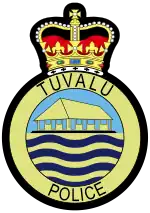Tuvalu Police Force
The Tuvalu Police Force is the national Police force of Tuvalu, it is headquartered in Funafuti and includes a Maritime Surveillance Unit, Customs, Prisons and Immigration. Police officers wear British style uniforms.
| Tuvalu Police Force | |
|---|---|
 Police emblem | |
| Agency overview | |
| Legal personality | Police force |
| Jurisdictional structure | |
| Operations jurisdiction | Tuvalu |
| General nature | |
| Operational structure | |
| Headquarters | Funafuti |
| Elected officer responsible | |
Police powers and responsibilities
The police service is managed in accordance with the Police Powers and Duties Act (2009) and the Police Powers and Duties Regulations (2012). The powers of arrest and search are described in Part III of the Criminal Procedure Code (1963).
The Penal Code (1965) is a codification of what crimes under Law of Tuvalu. This legislation is published online by the Office of the Attorney General of Tuvalu;[1] also by the Pacific Islands Legal Information Institute, with the law set out in the 2008 Revised Edition;[2] with a list of current legislation (up to 2012).[3]
Status under the Constitution of Tuvalu
According to the Constitution of Tuvalu,
157. The Police Force
(1) An office of Chief of Police is established as an office in the Tuvalu Police.
(2) The Chief of Police shall be appointed in accordance with section 159(5)(a) (which relates to the appointment of the Chief of Police).
(3) Excluding the Chief of Police, members of the Tuvalu Police of or above the rank of Inspector (or the equivalent rank as defined by or under an Act of Parliament) may be appointed, removed and disciplined in the same manner, with any necessary modifications, as members of the Public Service under section 155 (the Public Service).
(4) Other members of the Tuvalu Police may be appointed, removed and disciplined by the Chief of Police, subject to appeal to the Public Service Commission in the case of removal or disciplinary action.

Role in maritime surveillance
The HMTSS Te Mataili, a Pacific Forum patrol vessel, given to Tuvalu, from Australia, from October 1994 to early 2019.[4] Australia agreed to provide these vessels to smaller neighbours in the Pacific Forum, after the United Nations Convention on Laws of the Seas extended maritime nations Exclusive Economic Zones to 200 kilometers. Australia agreed its own security was improved if it gave its smaller neighbours vessels that enabled them to protect their own sovereignty, perform search and rescue, fishery patrol, and prevent smuggling. Australia replaced the Te Mataili with a larger and more capable Guardian class patrol vessel in April, 2019, named HMTSS Te Mataili II.[5][8]
Regional Assistance Mission to Solomon Islands
Tuvalu provided police officers to the Regional Assistance Mission to Solomon Islands from December 2004. Tuvaluan Police officer Fanini Maleko was the contingent commander of the Tuvaluan police serving as part of RAMSI's Participating Police Force (PPF).
Social institutions of Tuvalu
Each island has its own high-chief, or ulu-aliki, and several sub-chiefs (alikis). The community council is the Falekaupule (the traditional assembly of elders) or te sina o fenua (literally: "grey-hairs of the land").[9] As defined in the Falekaupule Act (1997), Falekaupule means "traditional assembly in each island...composed in accordance with the Aganu of each island". Aganu means traditional customs and culture.
Section 41 and Schedule 3 of the Falekaupule Act (1997) provides that “[i]t shall be the duty of every Falekaupule and of every Kaupule to use its resources to assist the police in the detection and prevention of crime within the area of its authority.”[10]
References
- "Tuvalu - Tuvalu Legislation On-line". Office of the Attorney General of Tuvalu. Retrieved 10 March 2014.
- "Tuvalu - Laws of Tuvalu 2008 Revised Edition". PACLII. Retrieved 10 March 2014.
- "Tuvalu – Current Legislation - alphabetical Index". PACLII. Archived from the original on 30 March 2014. Retrieved 10 March 2014.
- "Tuvalu country brief". Australian Department of Foreign Affairs and Trade. Retrieved 14 April 2010.
-
"AUSTAL DELIVERS FIRST GUARDIAN CLASS PATROL BOAT". Austal. 2018-11-30. Retrieved 2018-12-01.
'The program is now in a full rate of production, with the second vessel, which is destined for Tuvalu, successfully launched on Monday with an additional three vessels in various stages of construction. Austal are already looking at export opportunities for the GCPB' Mr Singleton said.
-
Christopher Pyne (2019-04-07). "Guardian Class Patrol Boat gifted to Tuvalu". Department of Defence. Archived from the original on 2019-04-08. Retrieved 2019-04-07.
Te Mataili II was received by the Prime Minister of Tuvalu, the Right Hon Enele Sosene Sopoaga at a handover ceremony attended by the Minister for Foreign Affairs, Trade, Tourism, Environment and Labour, the Hon Taukelina Finikaso, the Minister for Natural Resources, the Hon Dr Puakena Boreham, and the Commissioner of the Tuvalu Police Service, Commissioner Luka Falefou.
- Peter Bennetts and Tony Wheeler (2001). Time & Tide: The Islands of Tuvalu. Lonely Planet. ISBN 1-86450-342-4.
- "Falekaupule Act (1997)". PACLII. Retrieved 6 April 2014.